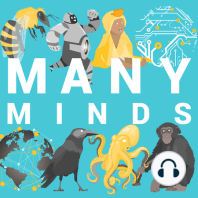13 min listen
Revisiting the dawn of human cognition
FromMany Minds
ratings:
Length:
56 minutes
Released:
Jun 1, 2023
Format:
Podcast episode
Description
There's a common story about the human past that goes something like this. For a few hundred thousand years during the Stone Age we were kind of limping along as a species, in a bit of a cognitive rut, let’s say. But then, quite suddenly, around 30 or 40 thousand years ago in Europe, we really started to come into our own. All of a sudden we became masters of art and ornament, of symbolism and abstract thinking. This story of a kind of "cognitive revolution" in the Upper Paleolithic has been a mainstay of popular discourse for decades. I’m guessing you’re familiar with it. It's been discussed in influential books by Jared Diamond and Yuval Harari; you can read about it on Wikipedia. What you may not know is that this story, compelling as it may be, is almost certainly wrong. My first guest today is Dr. Eleanor Scerri, an archaeologist at the Max Planck Institute for the Science of Human History, where she heads the Pan-African Evolution research group. My second guest is Dr. Manuel Will, an archaeologist and Lecturer at the University of Tübingen in Germany. Together, Eleanor and Manuel are authors of a new paper titled 'The revolution that still isn't: The origins of behavioral complexity in Homo sapiens.' In the paper, they pull together a wealth of evidence showing that there really was no cognitive revolution—no one watershed moment in time and space. Rather, the origins of modern human cognition and culture are to be found not in one part of Europe but across Africa. And they’re also to be found much earlier than that classic picture suggests. Here, we talk about the “cognitive revolution" model and why it has endured. We discuss a seminal paper from the year 2000 that first influentially challenged the revolution model. We talk about the latest evidence of complex cognition from the Middle Stone Age in Africa—including the perforation of marine shells to make necklaces; and the use of ochre for engraving, painting, and even sunblock. We discuss how, though the same complex cognitive abilities were likely in place for the last few hundred thousand years, those abilities were often expressed patchily in different parts of the world at different times. And we consider the factors that led to this patchy expression, especially changes in population size. I confess I was always a bit taken with this whole "cognitive revolution" idea. It had a certain mystery and allure. This new picture that’s taking its place is certainly a bit messier, but no less fascinating. And, more importantly, it’s truer to the complexities of the human saga. Alright friends, on to my conversation with Eleanor Scerri & Manuel Will. Enjoy! A transcript of this episode is available here. Notes and links 3:30 – The paper by Dr. Scerri and Dr. Will we discuss in this episode is here. Their paper updates and pays tribute to a classic paper by McBrearty and Brooks, published in 2000. 6:00 – The classic “cognitive revolution” model sometimes discussed under the banner of “behavioral modernity” or the “Great Leap Forward.” It has been recently featured, for instance, in Harari’s Sapiens. 11:00 – Dr. Scerri has written extensively on debates about where humans evolved within Africa—see, e.g., this paper. 18:00 – A study of perforated marine shells in North Africa during the Middle Stone Age. A paper by Dr. Will and colleagues about the use of various marine resources during this period. 23:00 – A paper describing the uses of ochre across Africa during the Middle Stone Age. Another paper describing evidence for ochre processing 100,000 years ago at Blombos Cave in South Africa. At the same site, engraved pieces of ochre have been found. 27:00 – A study examining the evidence that ochre was used as an adhesive. 30:00 – For a recent review of the concept of “cumulative culture,” see here. We discussed the concept of “cumulative culture” in our earlier episode with Dr. Cristine Legare. 37:00 – For an overview of the career of the human b
Released:
Jun 1, 2023
Format:
Podcast episode
Titles in the series (100)
The puzzle of piloerection: Welcome back folks! We’ve got an audio essay for you this week. It touches on art, music, the skin, the spine, individual differences, vestigial responses, tiny muscles. There’s even some Darwin thrown in there. It’s a fun one. Hope you enjoy... by Many Minds
